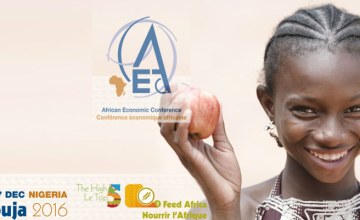Participants at the African Economic Conference 2016 in Abuja have identified integrated solutions as key to regional agro-allied industrialization.
Speaking at the "Plenary session 3: Fostering Agro-Allied Industrialization through Regional Value Chains," they observed that such solutions should digitalize all major interfaces between smallholder farmers and other value chain actors.
In a keynote address at the session, the Director for Africa at the International Food Policy Research Institute (IFPRI), Ousmane Badiane, highlighted the need to harness information communication technology (ICT) for quick gains.
He described ICT as essential to bending the profitability curve and escaping from low declining profits.
"We need integrated solutions. There is going to be amazing potentials for agro-allied industrialization driven by the dynamic processes going on in the regional markets. Demands are exploding. Incomes are growing and people are demanding more and better local staples in a variety menu," he noted.
He identified the market as key to regional agro-allied industrialization, noting that many African countries would reach middle income status by the year 2030 while all of them would be middle income countries by 2050.
This, he said, creates a great opportunity.
"Trade across all major regions is going to go up quite rapidly. The staple and local food (the cassavas, the millets, the cowpeas) are not all going to be consumed raw. They are all going to be processed," he said.
"What are the dynamics of demands in African urban markets by 2030? The local demand is a much bigger market and tapping into that through agro-allied industrialization, not just for export, is huge. If we are going to capture that in a way that brings smallholder farmers to be part of the model value chains, they stand to make US $30 billion. There are very few African economies who have a GDP of $30 billion today. That tells you how much money that they could make."
He highlighted how small agro-allied industries were springing up in Senegal.
"Now, today, you have all those ready-to-eat meals in containers on the shelves, ready for purchase. This has transformed eating habits in Dakar now. This has created jobs and enterprises, very important for women and youths," he observed.
He stressed, however, that regional industrialization is currently fragmented, stressing that the continent has an increasing number of small enterprises that need to acquire technology, capitals and skills for process and products sophistication.
"That is something that has to be orchestrated. It doesn't just happen haphazardly. A lot of things have to go into it but the opportunities are great, "he added.
Adam Elhiraika, Director of Macroeconomic Policy Division at the UN Economic Commission for Africa (ECA), stressed the need for policy interventions to promote value chains.
"It cannot happen by itself," he said. "When East Africa started to integrate, things started to change very quickly. Opportunities for processing, opportunities for market expansion and regional trades increased very rapidly. Now, Kenya is the major trading partner for almost all countries in East Africa.
"South Africa is the main trading partner for all countries in Southern Africa. We used to read text books telling us that African countries cannot trade among themselves because they have similar economic structures. That is wrong. That has held us back for a long time."
Hanna Gamal El Hilaly, Member of the High-Level Independent Team of Experts at the United Nations Economic and Social Council (ECOSOC), noted that the African continent was still under-tapped and called for integration between countries to tap into the huge agro-allied industrial potentials.
The 2016 African Economic Conference, taking place from December 5-7, 2016 in Abuja, is organized by the African Development Bank (AfDB), UN Economic Commission for Africa (ECA) and United Nations Development Programme (UNDP).


